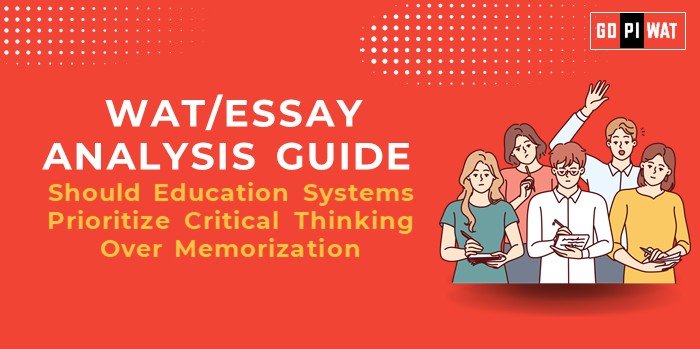📋 WAT/Essay Guide: Should Education Systems Prioritize Critical Thinking Over Memorization?
🌟 Understanding the Topic’s Importance
This debate touches on the heart of education reforms, linking directly to workforce readiness, innovation, and adaptability.
📝 Effective Planning and Writing
Planning: 5 minutes | Writing: 20 minutes | Review: 5 minutes
💡 Introduction Techniques for Essays
1. Contrast Approach: “In a world demanding innovation, reliance on rote learning risks leaving students ill-equipped for real challenges.”
2. Solution-Based: “The education system must balance foundational knowledge from memorization with creativity through critical thinking.”
📚 Structuring the Essay Body
- 🏆 Achievements: Discuss countries successfully transitioning to critical thinking models (e.g., Finland, Singapore).
- ⚖️ Challenges: Highlight systemic inertia, resource limitations, and transitional hurdles.
- 🔮 Future Outlook: Propose a blended approach emphasizing innovation while retaining core knowledge.
🔗 Concluding Effectively
1. Balanced Perspective: “Education systems must embrace hybrid models, combining rote learning for foundation-building with critical thinking for advanced problem-solving.”
2. Global Comparison: “From Finland to Singapore, models demonstrate the potential of emphasizing critical thinking.”
📊 Analyzing Successes and Shortcomings
- ✔️ Key Achievements: Boost in innovation and adaptability in systems prioritizing critical thinking.
- ⚠️ Ongoing Challenges: Lack of teacher training and infrastructure in resource-constrained regions.
- 🌍 Global Context: Finland’s success offers a replicable model for reforms.
🌱 Recommendations for Sustainable Progress
- 💡 Integrate experiential learning in curricula.
- 👩🏫 Provide teacher training for facilitating critical thinking.
- 📱 Utilize technology to support personalized, skill-based learning.
✍️ Sample Short Essays
1. Balanced Perspective:
“Critical thinking and memorization are complementary; their combined application builds both foundational knowledge and innovative capabilities.”
2. Solution-Oriented:
“By introducing inquiry-based learning alongside traditional methods, education systems can nurture well-rounded individuals.”
3. Global Comparison:
“Countries like Singapore show that prioritizing analytical skills does not mean discarding the benefits of rote learning.”


